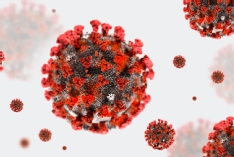In these last months, our lives have dramatically changed. Fortunately, things are slowly getting better in Europe, and we are starting to live the new reality, with caution but also with optimism. It is without saying how grateful we are and should be to all clinicians, nurses, and all health-care professionals who have been (and still are) at the frontline of the fight against COVID, saving as many lives as possible, even when governments failed to provide them with the necessary tools to carry on their work in appropriate conditions. To all of you, thank you. No words can express our infinite gratitude.
As young scientists confined at home, we all at the beginning tried to figure out how to cohabitate with the lockdown, with family (toddlers above everything), while advancing in our research in a timely manner. After the first weeks of “chaos” we would say, we raised our look and found out what the Scientific community is capable of doing in extreme situations such as the one we lived and are still living.
The SARS-CoV 2 virus was first reported on February 2020 by Zhou and colleagues (Nature. 2020;579:270–273), and in four months it has achieved the whopping 30,800 results in Pubmed and 629,000 entrances in Google Scholar. Both mass media and scientific press have advised that such amount of information may be misleading and some of the published papers must be revised or retracted. This might be true for a small percentage of works published, but this should not bring down all work performed by both scientists and clinicians, in collaboration or as independent teams, the aim of describing the virus, its mechanisms of action, the clinical manifestations of the COVID-19 and their potential treatments and vaccines. Several National and International consortia have been founded in record time, which are generating new knowledge about the virus and the disease every day, as well as developing new technologies to determine exposure and immunity to the virus.
It is obvious that these working conditions, when each day without significant results implied thousands of deaths tomorrow, are not always conducive to the conduct of high-quality science. However, if the pandemic has located the human species as a whole, we must learn this virus-driven lesson as scientists; we must consider ourselves as a unit in favour of knowledge, and foster interdisciplinary (and of course international) collaborations, far beyond COVID-19 related research.


 Our mission: To reduce the burden of cardiovascular disease.
Our mission: To reduce the burden of cardiovascular disease.